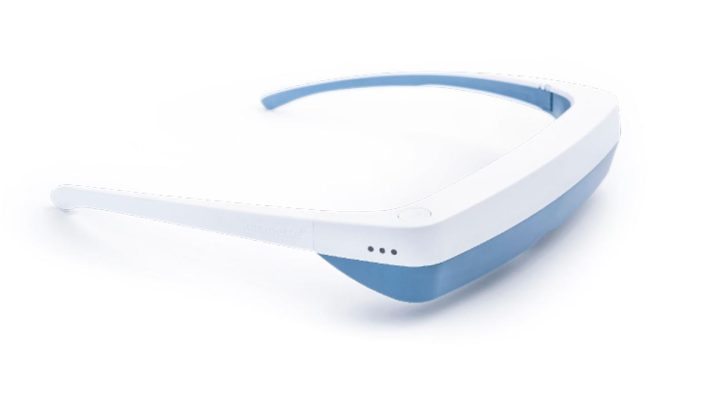Lifestyle
Using light therapy glasses to enhance mood and sleep
Introduction
Light therapy glasses are a popular tool used to enhance mood and improve sleep. These innovative glasses emit specific wavelengths of light that mimic natural sunlight, providing numerous benefits to individuals who may not have regular access to sunlight or struggle with mood disorders and sleep disturbances. By using light therapy glasses, individuals can potentially regulate their circadian rhythm, boost serotonin levels, and alleviate symptoms of seasonal affective disorder (SAD) and other mood-related conditions. Additionally, these glasses can help improve sleep quality by promoting melatonin production and reducing insomnia symptoms. Overall, light therapy glasses offer a convenient and effective way to enhance mood and sleep, providing a potential solution for those seeking natural and non-invasive methods to improve their well-being.
The Benefits of Using Light Therapy Glasses for Mood Enhancement
Light therapy glasses have gained popularity in recent years as a non-invasive and drug-free way to enhance mood and improve sleep. These glasses emit a specific type of light that mimics natural sunlight, which has been shown to have numerous benefits for our mental and physical well-being. In this article, we will explore the benefits of using light therapy glasses for mood enhancement.
One of the primary benefits of light therapy glasses is their ability to combat seasonal affective disorder (SAD). SAD is a type of depression that typically occurs during the winter months when there is less natural sunlight. The lack of sunlight can disrupt our circadian rhythm and lead to feelings of fatigue, low energy, and sadness. Light therapy glasses can help alleviate these symptoms by providing the necessary light exposure to regulate our internal body clock and boost our mood.
In addition to combating SAD, light therapy glasses have also been found to be effective in treating other forms of depression. Research has shown that exposure to bright light can increase the production of serotonin, a neurotransmitter that plays a crucial role in regulating mood. By increasing serotonin levels, light therapy glasses can help alleviate symptoms of depression and improve overall well-being.
Furthermore, light therapy glasses have been found to be beneficial for individuals with sleep disorders. Our sleep-wake cycle is regulated by the hormone melatonin, which is influenced by light exposure. By using light therapy glasses in the morning, when melatonin levels are naturally low, we can help reset our internal body clock and promote wakefulness. This can be particularly helpful for individuals who struggle with insomnia or jet lag.
Another advantage of light therapy glasses is their convenience and ease of use. Unlike traditional light therapy lamps, which require sitting in front of a stationary light source for a certain period of time, light therapy glasses can be worn while going about daily activities. This means that individuals can receive the benefits of light therapy without interrupting their daily routines. Whether it’s reading, working, or exercising, light therapy glasses can be incorporated seamlessly into our daily lives.
It is important to note that while light therapy glasses can be highly effective, they should be used under the guidance of a healthcare professional. The duration and intensity of light exposure may vary depending on individual needs and conditions. Consulting with a healthcare provider can ensure that the light therapy glasses are used safely and effectively.
In conclusion, light therapy glasses offer a range of benefits for mood enhancement. From combating seasonal affective disorder to improving sleep, these glasses provide a convenient and effective way to enhance our overall well-being. By mimicking natural sunlight, light therapy glasses can regulate our internal body clock, increase serotonin levels, and promote wakefulness. However, it is crucial to use light therapy glasses under the guidance of a healthcare professional to ensure safe and effective use. So, if you’re looking for a drug-free and non-invasive way to enhance your mood and sleep, light therapy glasses may be worth considering. https://www.amazon.com/New-2023-Wearable-Lightweight-Comfortable/dp/B0BT8G4NLQ
How Light Therapy Glasses Can Improve Sleep Quality
Light therapy glasses have gained popularity in recent years as a non-invasive and drug-free way to improve mood and sleep quality. These glasses emit a specific type of light that mimics natural sunlight, which can have a positive impact on our circadian rhythm and overall well-being. In this section, we will explore how light therapy glasses can enhance sleep quality and help individuals achieve a more restful night’s sleep.
One of the key benefits of light therapy glasses is their ability to regulate our internal body clock, also known as the circadian rhythm. Our circadian rhythm is responsible for regulating our sleep-wake cycle, and disruptions to this rhythm can lead to sleep disorders such as insomnia or delayed sleep phase syndrome. By exposing ourselves to bright light in the morning, we can help reset our circadian rhythm and promote wakefulness during the day. Light therapy glasses provide a convenient way to achieve this exposure, especially for those who may not have access to natural sunlight due to their work schedule or living environment.

In addition to regulating our circadian rhythm, light therapy glasses can also help combat the effects of seasonal affective disorder (SAD), a type of depression that occurs during the winter months when there is less natural sunlight. SAD can cause symptoms such as low energy, mood swings, and difficulty concentrating, all of which can negatively impact sleep quality. By using light therapy glasses, individuals can increase their exposure to bright light, which has been shown to alleviate symptoms of SAD and improve overall mood.
Furthermore, light therapy glasses can be particularly beneficial for individuals who experience jet lag or work night shifts. Jet lag occurs when our internal body clock is out of sync with the new time zone we are in, leading to sleep disturbances and fatigue. By using light therapy glasses to adjust our circadian rhythm to the new time zone, we can minimize the effects of jet lag and promote a quicker adjustment to the new environment. Similarly, individuals who work night shifts often struggle with maintaining a regular sleep schedule due to the disruption of their natural circadian rhythm. Light therapy glasses can help simulate daylight during their waking hours, making it easier for them to stay awake and alert during their shift, and then transition to sleep when they need to rest.
It is important to note that while light therapy glasses can be effective in improving sleep quality, they should be used in conjunction with other healthy sleep habits. This includes maintaining a consistent sleep schedule, creating a sleep-friendly environment, and practicing relaxation techniques before bed. Light therapy glasses should also be used at the appropriate time of day, typically in the morning or early afternoon, to avoid interfering with the natural sleep-wake cycle.
In conclusion, light therapy glasses offer a promising solution for individuals looking to enhance their sleep quality and overall well-being. By regulating our circadian rhythm and increasing exposure to bright light, these glasses can help improve mood, combat seasonal affective disorder, and alleviate the effects of jet lag and night shift work. However, it is important to use light therapy glasses in conjunction with other healthy sleep habits and at the appropriate time of day to maximize their benefits. With proper use and consistency, light therapy glasses can be a valuable tool in achieving a more restful and rejuvenating night’s sleep.
You can see more: Personalized Philadelphia Eagles Special Horror Skull Art Design 3D Hoodie
Exploring the Science Behind Light Therapy Glasses for Mood and Sleep Improvement
Using light therapy glasses to enhance mood and sleep has become increasingly popular in recent years. These innovative devices are designed to mimic natural sunlight and provide a range of benefits for individuals struggling with mood disorders or sleep disturbances. In this article, we will explore the science behind light therapy glasses and how they can be used to improve mood and sleep.
Light therapy glasses work by emitting a specific wavelength of light that is similar to natural sunlight. This light is absorbed by the retina in the eye and stimulates the production of serotonin, a neurotransmitter that is responsible for regulating mood and sleep. By increasing serotonin levels, light therapy glasses can help alleviate symptoms of depression, anxiety, and seasonal affective disorder (SAD).

One of the key benefits of using light therapy glasses is their ability to regulate the body’s internal clock, also known as the circadian rhythm. The circadian rhythm is responsible for regulating sleep-wake cycles and other physiological processes. Exposure to bright light in the morning helps reset the circadian rhythm and promotes wakefulness, while exposure to dim light in the evening signals the body to prepare for sleep.
Research has shown that using light therapy glasses in the morning can help individuals with insomnia fall asleep faster and improve the quality of their sleep. By exposing the eyes to bright light in the morning, light therapy glasses can help regulate the production of melatonin, a hormone that promotes sleep. This can be particularly beneficial for individuals who have difficulty falling asleep or staying asleep.
In addition to improving sleep, light therapy glasses have also been found to have a positive impact on mood. Studies have shown that regular use of light therapy glasses can reduce symptoms of depression and improve overall mood. This is thought to be due to the increase in serotonin levels that occurs with light therapy. Serotonin is known as the “feel-good” neurotransmitter and plays a crucial role in regulating mood.
Furthermore, light therapy glasses have been found to be effective in treating seasonal affective disorder (SAD), a type of depression that occurs during the winter months when there is less natural sunlight. Individuals with SAD often experience symptoms such as low mood, fatigue, and increased appetite. Light therapy glasses can help alleviate these symptoms by providing the necessary light exposure that is lacking during the winter months.
It is important to note that light therapy glasses should be used under the guidance of a healthcare professional. They should be used at specific times of the day and for a recommended duration to ensure optimal results. It is also important to choose a reputable brand of light therapy glasses that emit the correct wavelength of light.
In conclusion, light therapy glasses offer a promising solution for individuals struggling with mood disorders and sleep disturbances. By mimicking natural sunlight, these devices can help regulate the body’s internal clock and promote the production of serotonin, leading to improved mood and sleep. However, it is important to use light therapy glasses under the guidance of a healthcare professional to ensure safe and effective use.
Personalized Philadelphia Eagles Special Camo Hunting Design 3D Hoodie
Conclusion
In conclusion, light therapy glasses have shown potential in enhancing mood and sleep. These glasses emit specific wavelengths of light that mimic natural sunlight, which can help regulate circadian rhythms and improve mood. Additionally, light therapy glasses have been found to be effective in treating seasonal affective disorder (SAD) and sleep disorders such as insomnia. However, further research is needed to fully understand the long-term effects and optimal usage of light therapy glasses for mood and sleep enhancement.


Thanks for sharing. I read many of your blog posts, cool, your blog is very good.
I don’t think the title of your article matches the content lol. Just kidding, mainly because I had some doubts after reading the article. https://accounts.binance.com/sk/register-person?ref=OMM3XK51